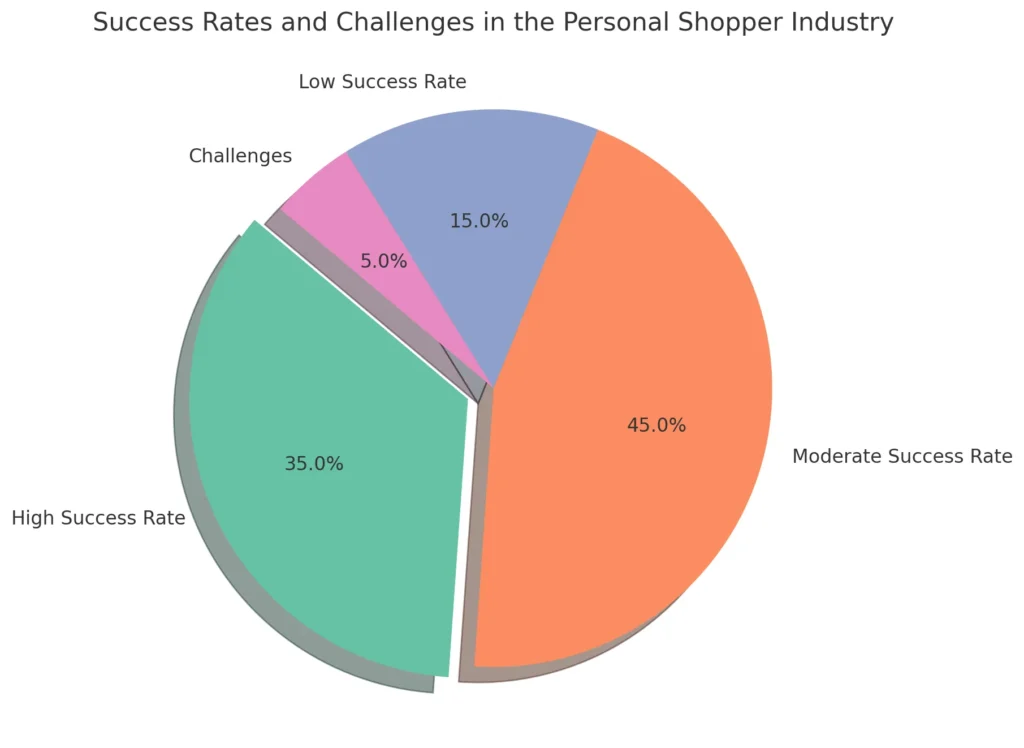Starting a personal shopper business has never been more promising. With busy lifestyles and the rise of personalized services, people are increasingly seeking expert help to make purchases that suit their taste, lifestyle, and budget. From high-fashion styling to efficient grocery selection, personal shoppers offer a range of tailored services to meet diverse client needs. This growing demand has turned the personal shopping industry into a lucrative field for budding entrepreneurs.
In this article, we’ll explore the top 10 personal shopper business ideas, each designed to capitalize on current consumer trends and market potential. Whether you’re passionate about fashion, technology, or helping people manage their everyday errands, there’s an opportunity here for you to start a rewarding business.
| Metric | Details |
|---|---|
| Market Size (2024) | $95 billion (2023) – $1200 billion (2032) |
| Annual Growth Rate | 8.6% CAGR (Compound Annual Growth Rate) |
| Key Demand Drivers | Personalized shopping experience, busy lifestyles, e-commerce growth |
| Popular Service Areas | Fashion styling, grocery shopping, gift purchasing, tech consulting |
| Top Client Segments | Busy professionals, senior citizens, fashion enthusiasts, corporate clients |
Read More “Top 10 Ideas for Personal Styling and Wardrobe Consulting Business Startups“
Why Choose a Personal Shopper Business?
The personal shopper industry is thriving in today’s fast-paced world, driven by a growing demand for customized shopping experiences and convenience. With people balancing work, family, and personal commitments, there’s a rising need for professionals who can provide tailored shopping assistance. This makes starting a personal shopper business a smart choice, offering both growth potential and the flexibility to specialize in a range of services—whether it’s curating outfits, sourcing rare items, or even helping with routine grocery shopping.
Beyond convenience, personal shopping services are increasingly in demand for their ability to provide expert recommendations, save clients time, and add value to their purchases. By leveraging a personal touch, personal shoppers build relationships with clients, ensuring a loyal customer base and repeat business. Additionally, with e-commerce showing no signs of slowing down, virtual shopping assistance is another area ripe for growth. As clients prioritize time-saving, personalized services, a well-positioned personal shopper business can thrive in this expanding market.
Current Trends and Future Opportunities in Personal Shopper Services
The personal shopper industry is evolving with exciting new trends and opportunities. Today, people want more than just convenience—they seek unique, personalized experiences. This shift has led to an increase in demand for niche services, like eco-conscious shopping, tech-assisted style recommendations, and virtual shopping consultations. These trends not only cater to current demands but also open doors for future growth, as shoppers increasingly look for meaningful purchases that align with their values and lifestyles.
| Trend/Service | Description | Impact on Industry |
|---|---|---|
| Eco-Friendly Shopping | Sourcing sustainable and ethical products to meet eco-conscious demands. | Attracts environmentally-aware clients; builds trust and loyalty. |
| Virtual Styling | Offering remote style consultations via video call or chat. | Expands client base globally; enhances convenience. |
| AI-Assisted Shopping | Using AI tools to analyze preferences and suggest products. | Improves personalization; appeals to tech-savvy clients. |
| Digital Wardrobe Management | Managing clients’ wardrobes, advising on purchases, and decluttering. | Increases long-term engagement; offers ongoing value. |
Technological advancements are another significant driver in this industry. Many personal shoppers are now using AI-powered tools to analyze client preferences, suggest outfits, or even recommend sustainable products, enhancing the quality of their services. Virtual shopping, where clients receive live shopping assistance from anywhere in the world, is another popular trend. This approach appeals to both local and global clients, giving personal shoppers a competitive edge.
Looking forward, personal shopping is expected to expand in areas like digital wardrobe management, online gift sourcing, and sustainable fashion. Entrepreneurs who keep an eye on these evolving trends will be well-positioned to offer services that meet modern consumer expectations and capitalize on the industry’s upward momentum.
Top 10 Ideas for Personal Shopper Business Startups
Launching a personal shopper business gives you the chance to specialize in niche areas, each offering unique benefits and growth potential. Here are the top 10 business ideas for aspiring personal shoppers in 2024:
| Business Idea | Target Market | Estimated Startup Cost | Profit Potential |
|---|---|---|---|
| Fashion Stylist for Busy Professionals | Corporate clients, executives | Moderate | High |
| Sustainable Shopping Consultant | Environmentally-conscious consumers | Low | Moderate |
| Tech Gadget Personal Shopper | Tech enthusiasts, gift buyers | Low | Moderate |
| Virtual Shopping Assistant | Remote clients, international customers | Minimal | High |
| Gift Personal Shopper | Busy individuals, corporate clients | Moderate | Moderate to High |
| Luxury Personal Shopper | High-net-worth individuals | High | High |
| Wardrobe Organizer and Shopper | Minimalist clients, busy professionals | Low to Moderate | Moderate |
| Grocery and Household Shopper | Busy households, senior citizens | Low | Moderate |
| Event Shopper for Special Occasions | Event planners, corporate clients | Moderate | High |
| Personal Shopper for Senior Citizens | Senior community | Low | Moderate |
1. Fashion Stylist for Busy Professionals
Provide tailored wardrobe services for professionals looking to maintain a sharp image without time-consuming shopping.
- Target Market: Corporate clients, executives
- Estimated Costs: Moderate (clothing samples, transportation)
- Startup Requirements: Styling tools, access to clothing collections
2. Sustainable Shopping Consultant
Guide clients in making eco-friendly and ethical purchases, focusing on sustainable products.
- Target Market: Environmentally-conscious consumers
- Estimated Costs: Low (primarily research-based)
- Startup Requirements: Knowledge of sustainable brands, eco-conscious suppliers
3. Tech Gadget Personal Shopper
Assist clients in selecting the latest gadgets, tailored to their needs and budget.
- Target Market: Tech enthusiasts, gift buyers
- Estimated Costs: Low (consulting-based)
- Startup Requirements: Tech expertise, access to product catalogs
4. Virtual Shopping Assistant
Offer online shopping assistance via video calls, guiding clients through purchases in real-time.
- Target Market: Remote clients, international customers
- Estimated Costs: Minimal (technology setup)
- Startup Requirements: Video conferencing tools, stable internet
5. Gift Personal Shopper
Specialize in sourcing unique gifts for holidays, birthdays, and other occasions, offering personalized recommendations.
- Target Market: Busy individuals, corporate clients
- Estimated Costs: Moderate (including sample gifts)
- Startup Requirements: Gift sourcing tools, vendor partnerships
6. Luxury Personal Shopper
Curate high-end fashion, accessories, or home decor for clients interested in exclusive, luxury items.
- Target Market: High-net-worth individuals
- Estimated Costs: High (luxury inventory access)
- Startup Requirements: Connections to luxury brands, premium shopping channels
7. Wardrobe Organizer and Shopper
Help clients streamline their wardrobes and shop for essential, versatile items only.
- Target Market: Minimalist clients, busy professionals
- Estimated Costs: Low to moderate (depending on services)
- Startup Requirements: Organizational tools, wardrobe strategy knowledge
8. Grocery and Household Shopper
Provide regular grocery and household shopping services, catering to clients with demanding schedules.
- Target Market: Busy households, senior citizens
- Estimated Costs: Low (mainly transportation)
- Startup Requirements: Reliable transportation, scheduling tools
9. Event Shopper for Special Occasions
Assist clients in preparing for events by sourcing outfits, decorations, and event essentials.
- Target Market: Individuals planning events, corporate clients
- Estimated Costs: Moderate (event-specific inventory)
- Startup Requirements: Event planning knowledge, vendor network
10. Personal Shopper for Senior Citizens
Offer personalized shopping assistance for senior citizens, ensuring ease in obtaining essential items.
- Target Market: Senior community
- Estimated Costs: Low (focused on support and convenience)
- Startup Requirements: Comfortable transportation, senior-friendly support tools
Real-World Examples
Exploring real-world examples of successful personal shopper businesses offers valuable insights into what works and what potential challenges exist. From niche services like sustainable shopping to virtual style consultations, these businesses demonstrate the power of specialized services in attracting dedicated clients and building strong reputations.

For instance, businesses focusing on eco-conscious shopping have seen growth among environmentally-aware customers, who prioritize sustainable and ethical products. Virtual styling, on the other hand, appeals to clients worldwide, offering them remote access to fashion expertise without leaving their homes. This flexibility not only widens the customer base but also shows that personal shopping is adaptable to digital spaces.
These examples highlight both the high demand and diverse opportunities in the personal shopper industry. While some businesses thrive through exclusive luxury offerings, others succeed by targeting everyday needs, like grocery shopping and wardrobe management. Learning from these successes can guide new entrepreneurs in shaping their services and focusing on areas with high client appeal and growth potential.
Read More “How to Build a Sugar Daddy App: A Complete Guide for Developers“
Mistakes to Avoid When Starting a Personal Shopper Business
Starting a personal shopper business can be incredibly rewarding, but it comes with its own set of challenges. New entrepreneurs often make avoidable mistakes that can impact their growth and client satisfaction. Recognizing and steering clear of these common pitfalls can set the foundation for a successful business.
| Common Mistake | Description | Preventive Measure |
|---|---|---|
| Lack of Niche Focus | Offering too many services at once, leading to a diluted brand. | Focus on a specific niche (e.g., fashion or grocery shopping) to build expertise and brand identity. |
| Poor Client Communication | Infrequent or unclear communication leading to dissatisfaction. | Maintain regular updates and check-ins with clients to ensure satisfaction. |
| Underestimating Costs | Ignoring hidden costs like transportation and tech setup. | Track all expenses from the beginning to manage and plan budgets effectively. |
| Neglecting Client Feedback | Failing to gather insights from clients for improvement. | Set up a feedback system to gather and respond to client suggestions and complaints. |
| Inconsistent Service Quality | Not maintaining standards across all interactions and transactions. | Develop a service checklist and follow consistent processes for each client. |
One frequent mistake is failing to define a specific niche. With so many options—fashion, luxury goods, grocery shopping, and more—offering too many services at once can dilute your expertise. Focusing on a specific area helps in building a strong, recognizable brand that attracts loyal clients. Similarly, another common misstep is neglecting client communication. Since personal shopping is service-driven, clear, consistent communication with clients about their preferences and updates on orders is crucial for client satisfaction and long-term relationships.
Another area to watch is budgeting and cost management. Many new personal shoppers underestimate the costs involved, especially in transportation, sourcing, and tech setup for virtual consultations. Keeping track of expenses from the start ensures you remain profitable and prepared for growth. Lastly, remember to prioritize client feedback. Ignoring it can limit your ability to improve and adapt to client needs, so establishing a feedback loop from the beginning is essential.
Why Trust Miracuves Solutions for Your Next Project?
When it comes to launching and growing a personal shopper business, Miracuves Solutions is here to help you succeed. With a proven track record in delivering tailored app solutions and supporting startups, Miracuves Solutions understands the unique needs of businesses in the personal shopper industry. Our expertise allows us to create applications that streamline client interactions, manage inventory, and provide seamless virtual shopping experiences—all designed to help you stand out in a competitive market.
Choosing Miracuves Solutions means working with a partner dedicated to your success. We prioritize client satisfaction and build each solution with scalability and ease of use in mind. Whether you’re just starting or looking to expand your personal shopper services, our team’s commitment and knowledge in app development and business strategy will ensure you have the right tools to thrive.
Conclusion
Starting a personal shopper business offers exciting opportunities to provide customized, high-value services to clients seeking convenience and expertise. By choosing a niche, staying updated with trends, and avoiding common mistakes, you can create a unique and profitable venture that meets the evolving needs of today’s consumers. From eco-conscious shopping to luxury item sourcing, the personal shopper industry is ripe with possibilities for growth and innovation.
Ready to take the next step? Define your niche, connect with clients, and start building a personal shopper business that stands out and thrives in 2024 and beyond.
FAQs
What qualifications are needed to become a personal shopper?
You don’t need formal qualifications, but experience in customer service, fashion, or retail can help. Building knowledge in specific areas (like styling or product sourcing) is also beneficial.
How can I attract my first clients as a personal shopper?
Start by promoting your services on social media, reaching out to friends and family, and offering initial discounts to build a client base and gather testimonials.
Is it expensive to start a personal shopper business?
The cost varies by niche, but many personal shopper services can be started with minimal investment, especially if you offer virtual consultations.
Can I operate a personal shopper business online?
Yes, virtual personal shopping has become popular. You can provide consultations, styling advice, and even shopping services entirely online.
What challenges do personal shoppers face?
Common challenges include managing client expectations, handling high demands during holidays, and differentiating your services in a competitive market.








